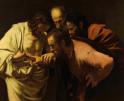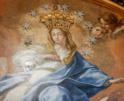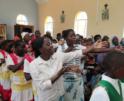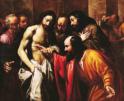
Faith
Because of the centrality of the Mass in Catholic life, the way the changes were haphazardly enacted, the frequency of deviations and abuses surrounding its celebration, and the wider struggles of the Church in the years following its implementation, the Novus Ordo soon became the icon and symbol for all the changes in the Church . . .
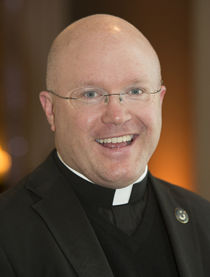
Landry
On November 30, the Church marks the 50th anniversary of when the Novus Ordo, or "Mass of Paul VI," debuted as the ordinary form of the Roman Rite of the sacred liturgy.
St. Paul VI had promulgated the new Roman Missal eight months earlier, but, by the time the first Sunday of Advent came around, the new liturgical books were not yet ready, and so the roll out was rather bungled and confusing, for priests and people alike.
In many places, that disarray continued, as some thought that the "new Mass" not only allowed for but demanded creativity. This led to a period of sweeping liturgical instability and experimentation that dramatically impacted Church prayer, architecture, art, and music. It also led to a more generalized ecclesial chaos: if something like the Mass could be altered so significantly and often in seemingly arbitrary ways, why could the same spirit of "renewal" not be extended to Church sexual teachings, the nature of religious life, priestly celibacy, and more?
Because of the centrality of the Mass in Catholic life, the way the changes were haphazardly enacted, the frequency of deviations and abuses surrounding its celebration, and the wider struggles of the Church in the years following its implementation, the Novus Ordo soon became the icon and symbol for all the changes in the Church after the Second Vatican Council -- those intended by the Council, those never considered, and those absolutely unintended.
To support the Novus Ordo therefore came to mean approving not only the substantive changes it contained but also what it didn't: the "renovation" of sanctuaries; the moving of tabernacles to the side; hymns of inconsistent quality; vestments, banners and liturgical appointments of variable beauty; a ministerialization of the laity; an exaggerated emphasis of banquet over sacrifice; a focus on priest and community over a theocentric sense of the sacred; communion in the hands; priests celebrating in bathing suits on the beach; and more.
Similarly, if one preferred some things the way they had been, like Gregorian Chant, Mass ad orientem or receiving communion at the altar rail, none of which was required to change, one was prone reflexively to take issue with the Mass of Paul VI as a whole.
For example, many of those, especially young adults, who frequent the extraordinary form of the Roman Rite, celebrated according to the 1962 ritual that stretches back to the Council of Trent, do so, in my opinion, not because they have major issues with the Novus Ordo per se, but because they prefer the general liturgical fidelity and reverence of priests who celebrate the extraordinary form, the conspicuous focus on God, the sacred music, the way Holy Communion is received, the promotion of priestly vocations through in the training of altar boys, and several other things still possible, but far less common, in the celebration of the Novus Ordo.
I think it's good, therefore, as we mark the golden jubilee of the Novus Ordo, to separate the "substance" of its reforms from the "accidents" of its historical context and implementation. This is a means by which we can appreciate it more and, where necessary, commit ourselves, as priests and faithful, to praying it more devoutly and fruitfully.
I love the Novus Ordo. I love the extraordinary form. I love the rites of the Mass in the Eastern Churches. How can one not love any valid means by which the Son of God, by the power of the Holy Spirit and the grace of sacred ordination, comes from heaven to the altar under the appearances of bread and wine?
The Novus Ordo brought, I believe, many improvements compared to the extraordinary form: a much greater use of Scripture; a homily based on the Word of God rather than a sermon on a spiritual theme; a much broader and richer set of Prefaces, Eucharistic Prayers, votive Masses and Masses for various needs and occasions; a more extensive and better organized sanctoral calendar; the use of the vernacular for readings and the prayers, which facilitates prayerful reception; the priest's saying most of the prayers audibly so that people can hear and unite themselves to them more fully; everyone's praying the Our Father in its entirety; a greater sense of praying together as a community through praying Mass parts out loud together; the possibility to receive Communion under both species; and a more accessible experience overall for potential converts.
When done well, it certainly can lead, in my opinion, to a more full, active and conscious participation by a greater number in praying the Mass, and therefore, according to the ancient aphorism lex orandi, lex credendi, lex vivendi, can help more people to pray, believe and live the Christian faith better.
At the same time, I think, various helpful aspects were lost in the transition. The Pentecost Octave was sadly eliminated, as was linking the main part of the liturgical year to Pentecost. Several of the priest's silent prayers, which help him better pray the whole Mass, were excised, like those going up to the altar or during the different incensations. There was a dramatic reduction of the number of genuflections and the reverence they provoke and convey. There was a loss of a sense of history and a clearer connection to praying the Mass as have so many generations of saints, martyrs and loved ones who had gone before us. There was also a weaker "catholic" experience of the Mass, as inconsistent or poor translations led to widely divergent things being prayed in different cultures.
Overall, however, when weighing the two forms, I think the gains outweigh the losses. The fiftieth anniversary of the Novus Ordo's debut is, therefore, a time to thank God for those gains.
At the same time, however, it's an occasion to look maturely at the bigger picture and grasp that, because of various liturgical changes made beyond the Novus Ordo as well as the failure in many places to confront and stop liturgical abuses, the promise of the liturgical reform has not been fulfilled. As so many surveys, including the Pew Forum report released in August, have distressingly shown, over the last 50 years, there have been dramatic decreases not only in Mass attendance but in faith in Jesus' Real Presence.
A half-century ago, right before the celebration of the Novus Ordo began, Saint Paul VI gave two Wednesday general audiences about the changes that were about to take place and talked about the promise. It would not be a "new Mass," he said, because "the Mass of the new rite is and remains the same Mass we have always had." Rather, it would constitute a "new epoch" in the Church's life, a "step forward for her authentic tradition," in which "the relationship between the Liturgy of the Word and the Liturgy of the Eucharist [will be] brought out more clearly," the faithful will be able to "participate in the liturgical mystery with more understanding, in a more practical, a more enjoyable and a more sanctifying way," and, understanding better what they are praying, will therefore be able better to exercise their "royal priesthood" in "supernatural conversation with God."
This would happen, he said presciently, "if the rite is carried out as it ought to be." That has proven to be a big "if," especially in the early decades of implementation.
To celebrate the Novus Ordo "as it ought to be" means ensuring always and everywhere that the liturgy conveys a profound sense that one is in God's presence, facilitates loving God with all our heart, mind, soul and strength, and opens us up so that God can transform us by this encounter to love our neighbor as he loves us.
This not only can happen, but does, when the celebration of the Novus Ordo takes place with proper preparation, beauty and reverence.
That's what every Catholic has a right to. That's what Saint Paul VI intended. That's what the Church and the world need.
- Father Roger J. Landry is a priest of the Diocese of Fall River, Massachusetts, who works for the Holy See's Permanent Observer Mission to the United Nations.
Recent articles in the Faith & Family section
-
Wounds, not scarsJaymie Stuart Wolfe
-
A special collection in the liturgy libraryFather Robert M. O'Grady
-
Witness to a Transfiguration in KenyaMichele Miers
-
Understanding the ScripturesScott Hahn
-
'Cabrini' does extraordinary job of bringing saint to lifeBishop Nicholas DiMarzio

